The V1 has a bluetooth module available for both iPhone and Android users. However, you don’t get the same experience on both platforms. The Android options are significantly better for several reasons. In this video I’m going to go over what the similarities and differences are and what Android offers that iPhone users don’t get so that if you’re an iPhone user, you can decide whether or not it makes more sense to stick with iOS or to add a cheap Android phone and get the Android version instead for your V1.
So the way things boil down, Valentine produces an app for both iOS and Android and with that app, the features and benefits are the same. Both platforms will give you things like an external display, a frequency display, an easier way to change settings, and the ability to program in custom sweeps for better performance. These are all benefits that you don’t get with just a standalone V1 so it’s worth adding a bluetooth module and phone no matter which platform you go with.
The differences lie in the thirdparty apps as well as the fact that we get more control with Android than we do with iOS. On iPhone there’s an app called StealthAssist and on Android there’s an app called YaV1. Let’s take a closer look at the apps.
StealthAssist for iOS
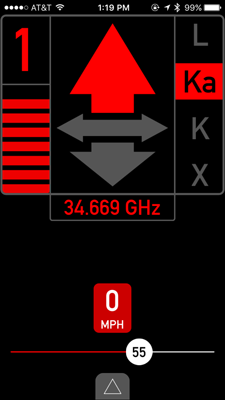
StealthAssist is basically a low speed muting app. You see that slider at the bottom of the screen? You select a speed and it will automatically mute signals when you’re traveling below your set speed. It’s an alternative to Savvy which is an accessory you can buy from Valentine which plugs into your car’s OBD-II port to accomplish the same thing. StealthAssist uses your phone’s GPS instead. It also gives you a display for your detector, a frequency display, and a little bit of customization options like changing the color of the display, but that’s really about it.
StealthAssist doesn’t let you do things like change your V1’s settings, enable custom sweeps, use boxes for muting various signals, and so you’ll need to keep the Valentine app on hand because it offers a lot more options than StealthAssist. StealthAssist is kind of a one trick pony with its low speed muting.
Personally I like the display of the Valentine app better. You get a lot more useful information all at once and a variety of different ways to display different alerts. Here’s how things look seeing just one Ka band signal.
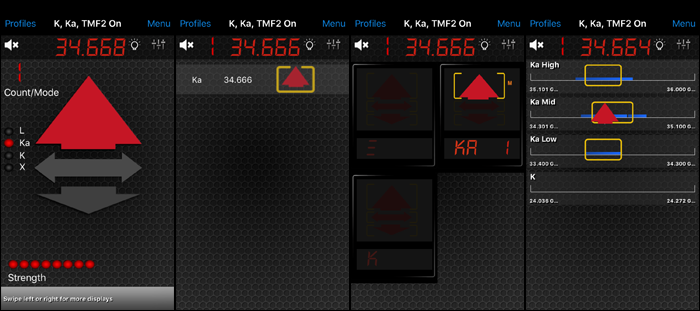
Now the thing is that you can’t run StealthAssist and the Valentine app at the same time. You can only have one app connected to and controlling your V1 at a time. So if you want the low speed muting, you can run StealthAssist as your primary app and use the Valentine app to configure your V1 as needed, which realistically isn’t something you’ll need to do much once you get it set up initially. However, if you prefer the look of the Valentine app, you can’t use StealthAssist to get low speed muting. You’ll have to use Savvy for this feature.
Now with both the Valentine app and with StealthAssist, you’re missing out on some pretty killer features that are only available on YaV1, so let’s look at that next.
YaV1 for Android
YaV1 is also a free thirdparty app like StealthAssist, except in this case it’s jam-packed with helpful features. Not only can it do everything that the Valentine app and StealthAssist can do in one integrated package so you don’t have to switch between two apps, but it also offers features not available on iOS with either app.
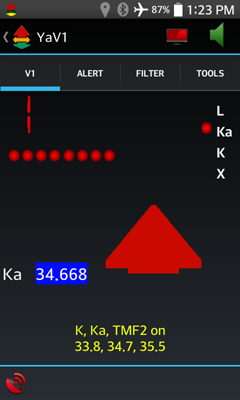
The biggest difference and what people would bring up first when you ask them about the difference is that YaV1 offers GPS lockouts. Basically the app can learn where your stationary false alerts are located and begin automatically locking them out over time. You can also tell it to lock signals out manually if you want to speed up the process.
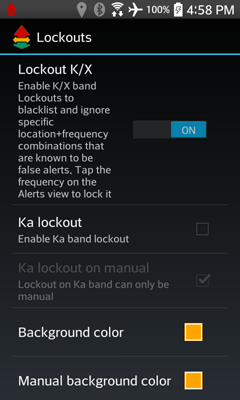
It’s a feature that you’ll see in Escort, Beltronics, Uniden, and Stinger radar detectors, and once you get used to it, it’s hard to go back to running a detector in the city without it.
The background alerts are much better with YaV1 as well. When you get an alert with YaV1, a nice overlay pops up on screen with all the relevant information at a glance like the arrow, signal strength, and frequency.
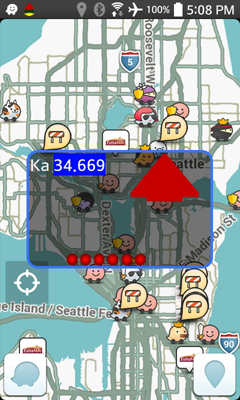
You can get a background notification on iOS too, but it doesn’t display as much useful information.
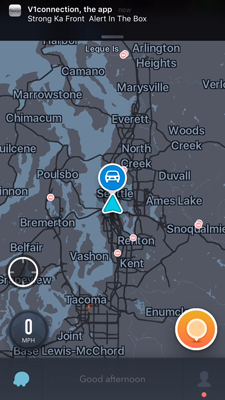
Another cool trick is the ability to get enhanced voice alerts. You can upload voice files to your Android and tell YaV1 to play it under certain conditions. For example, when I get a 34.7’ish signal, the phone will announce 34.7 for me. You still get the normal beeps of course and you can even have the phone beep like the detector would. This is an addon on top of what the V1 already offers. Here’s a quick demo.
Android also gives us much more control. For example, if you want to automate YaV1 to turn on/off with your car, you can do it easily by downloading Llama, a free automation app. You can do some of the same things with an iPhone, but it requires you to jailbreak your phone and use Activator, but even still it doesn’t offer quite the level of control as Android does. Here’s a look at setting up Llama with YaV1.
Now if you’re an iPhone user, you can pick up an Android phone super cheap. Most people just get a prepaid phone and never bother activating it so it basically becomes a dedicated YaV1 display. I’m currently using this one, but really almost any modern phone will work fine. They’re super cheap now and once you buy it there’s no additional costs after that. You don’t need phone service or data. Just use wifi to download the app and update things over time. GPS is free and the only other thing is Bluetooth and you’re set.
You’ll need to set up an extra phone charger and phone mount, but it’s an awesome solution and is highly recommended over iOS. People ask all the time if YaV1 is coming to the iPhone and the answer is no. It’s Android only and that’s the primary reason why it’s the preferred solution.
If you need help getting set up with YaV1, you can check out my YaV1 videos here.
Enjoy! 🙂
| This website contains affiliate links and I sometimes make commissions on purchases. All opinions are my own. I don’t do paid or sponsored reviews. Click here to read my affiliate disclosure. |


3 comments
What lg android phone are you using I mean what model.
I am an iPhone guy but am considering getting an Android phone to pair with a new V1. To make it work would I need cell service on the phone? IOW, is the GPS function dependent on having say AT&T service? Any recommendations on an inexpensive Android device, its sole use being for this purpose? I have never owned an Android device so nothing about them.
Author
It’s actually quite easy. You don’t need internet for your Android. https://youtu.be/WEjMw28xGDI As far as which phone, most any one made these days should work. I’ve been using this one. http://amzn.to/1K1u2O3